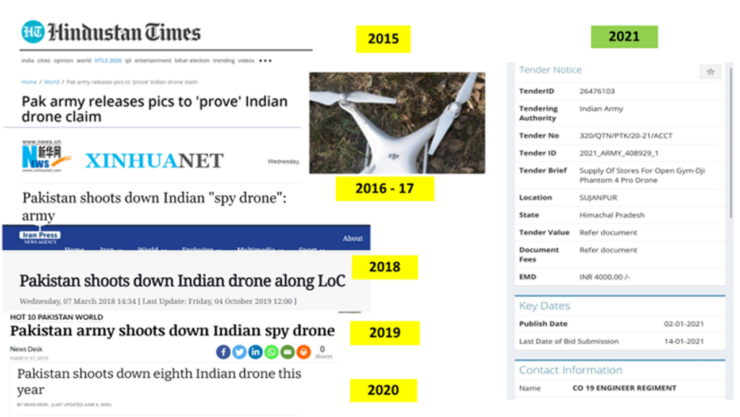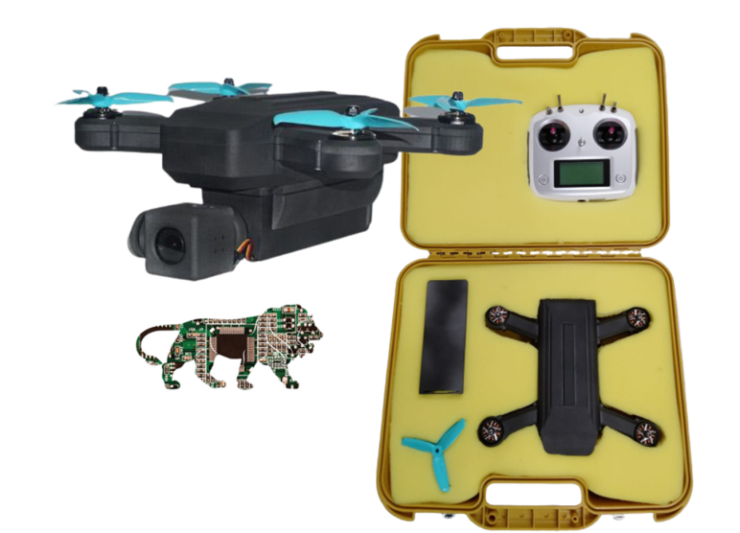
Today the word ‘drone’ is immediately associated with the above picture which is that of the DJI ‘Phantom’—the iconic Chinese drone that has captured both the imagination and markets across the world, India being no exception.
The government estimate of these illegally imported drones in India is around 6 lakh with an additional estimated 1.5 lakh with the Indian defence forces. Multiples of these drones exist practically in every military unit installation and asset including strategic airfields across the country.
In military parlance, products such as DJI are called COTS (Commercial Off The Shelf) drones.
How did Chinese DJI Drones find their way into the frontline of Indian defence units?
Intriguing as it may be but the fact is that that DJI, a Chinese company, despite the illegality, did find a way to get its products into India’s military establishment all the way down to units based in forward areas in large numbers. Something well-known and established Indian defence drone manufacturers couldn’t achieve despite the fact that every single DJI purchased by the defence forces and sold in India has been illegally imported.
Assuming a price of Rs 1.5 lakh per drone, cumulatively, defence funds in excess of Rs 2,000 crore amounting to an average of Rs 400-500 crore per year have been spent on buying DJI drones.
To be fair though we can take consolation from the fact that defence forces the world over have resorted to the obtaining and use of these drones.
Chinese DJI drones in Indian defence: The enemy within
Concerns of DJI drones leaking data have been around for a while now among the various nations across the world with the US being a leader in these investigations.
Indian defence and security organizations have also found this to be true. Systematic investigations by governments across the world has resulted in actions by major governments like the US initiating either a complete ban or restrictions on their use
- https://www.bloomberg.com/news/articles/2021-12-19/drone-wars-us-china-fight- over-big-data-shifts-from-tiktok-wechat-to-the-sky
- https://www.moneycontrol.com/news/business/us-to-add-8-chinese-companies-to- investment-blacklist-report-7827821.html
- https://www.newsweek.com/fcc-commissioner-calls-chinese-drone-company-potential-airborne-version-huawei-1640615
Learnings from the DJI Experience for Indian defence

The use of DJI COTS drones by the Indian defence forces over the past six years is an open and well-published secret.
The huge population of DJIs in Indian defence with an average annual spend of Rs 400-500 crore on COTS drones clearly points to certain very important trends in the defence space:
- COTS products like DJI drones sold in lakhs of pieces despite the known data security risks while those manufactured by Indian defence manufacturers sold only a couple of hundred pieces
- There is significant demand for a functional good COTS products in their existing form among defence forces
- Not every product needs to be military grade to be used in defence
- Value for money in terms of features and price—in this case around Rs 1 lac per camera drone—is preferred as compared to expensive military grade products
- Defence procurement needs to take advantage of the economies of scale and operational efficiency of COTS products with little or no modification
- The existence of DJIs proves that the existing decentralized regimental procurement route for procuring COTS products works. Hence, creating a kind of a GEM specifically for COTS products for defence could be an improved method of channelizing this procurement system
The Indian Army has already made significant progress in this direction by establishing Army Design Bureau (ADB) which is spreading its reach further by the opening of Regional Technology Nodes in Pune and cities like Chennai, Bangalore and Hyderabad.
This initiative would go a long way in rapidly inducting COTS products and technologies into the Army.
Mitigating the enemy within
US defence forces when faced with exactly the same problem in terms of the enemy within are resolving this problem by having an indigenous American COTS drones manufactured by SKYDIO to replace the DJI fleet among their defence forces.
The first SKYDIO R 1 was launched in 2018 and has evolved since then with a strong product line of both commercial and military COTS drones.
The sheer volumes to be replaced across the country could be the reason SKYDIO is not available for sale outside the US.
Indian defence requires to do exactly the same thing by converting to an Indian equivalent of Skydio 2 to plug the known data leakage of its strategic assets and forward units by the continued use of DJI drones.
It badly needs a supplier who can provide its units low cost COTS short range recon drones like Skydio.
One of the key requirements for creating products that can compete directly with the feature-rich-low-cost DJI drones is the need for complete end-to-end control of the flight controller (autopilot).
The autopilot is that piece of electronic hardware on the drone that actually makes unmanned flight possible and is also a costly piece of equipment if purchased from a third party or imported.
ZUPPA Geo Navigation Technologies, Chennai, is the only Indian company with its own unique proprietary fully #Atmanirbhar computing technology that has developed India’s only autopilot for unmanned systems called NavGati. It is this unique advantage that ZUPPA has leveraged to create AJEET MINI—India’s only COTS drone for Indian defence.
ZUPPA’s soon to be launched AJEET MINI is designed to be a rugged, tough, practically crash-proof COTS drone that matches the DJI’s performance to deliver a short recon drone for defence use at a price below Rs 1 lakh per drone.
ZUPPA’s end-to-end control of the technology and product design ensures that it is adaptable to a range of use cases across both climatic as well as operational needs of the defence forces.

- Ajeet Mini Trainer (Without Camera): Training Front Line Operators
- Ajeet Mini Developers (Without Camera): Platform for Defence Startup Ecosystem for application Development
- Ajeet Mini RTK: GIS Survey and Mapping for Corps of Engineers
- Ajeet Mini Tethered: For Special Operation Missions
- Ajeet Mini Swarm with UGV: Micro Swarm applications like Urban Combat
- Ajeet Mini Loitering Munition: Low intensity Precise Explosions in Swarm mode
………………………Many more user specific requirements
AJEET MINI is scheduled to launch in March 2022 and with the support from organizations like ADB is expected to address the “enemy within“ problem faced by Indian defence forces in the days to come.
In conclusion, it is critical that Indian defence mitigates the “enemy within“ problem created by the use of DJI Drones on a war-footing and resolves this huge security threat on a priority basis using home-grown products and technologies.
ZUPPA GeoNavTech stands committed to resolve this huge security gap with its completely indigenous products and technologies.
-The writer is a thought leader in the field of drones and 5th Generation future technologies. He has actively championed the need for Atmanirbharta in key future technologies and has played an active part in the recent civilian drone policy. He has published several articles on the subject of the National Security threats posed by the huge population of illegally imported Chinese DJI Drones and has always endeavoured to highlight this serious issue at every available opportunity across forums both on and off line.








